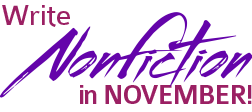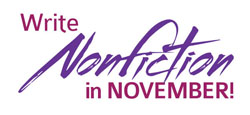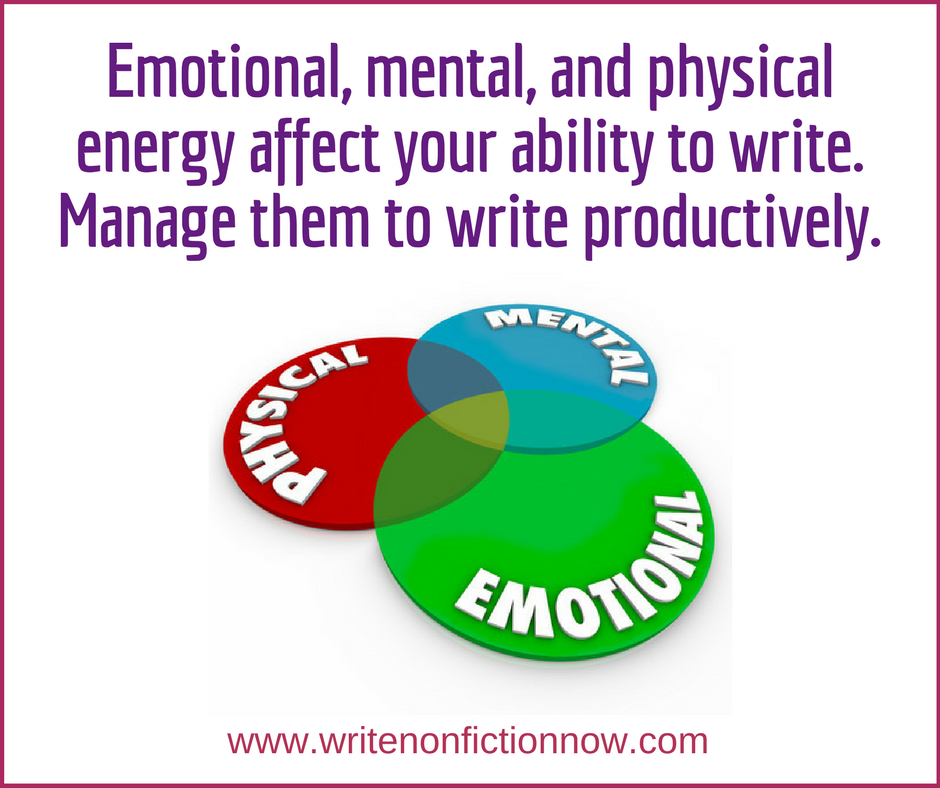 This post is part of the Write Nonfiction in November Challenge (WNFIN), also known as National Nonfiction Writing Month (NaNonFiWriMo), which is sponsored by the Nonfiction Writers’ University — join today for just $1! To find out more or participate in the WNFIN challenge, click here.
This post is part of the Write Nonfiction in November Challenge (WNFIN), also known as National Nonfiction Writing Month (NaNonFiWriMo), which is sponsored by the Nonfiction Writers’ University — join today for just $1! To find out more or participate in the WNFIN challenge, click here.Energy. Few writing teachers or book coaches speak about how your physiology affects your ability to write. In fact, energy affects every aspect of your success as a writer. But never is this truer than when you have a deadline looming over your head—a deadline like finishing a book in a month.
Many writers who decide to start and finish a book in 30 days begin strong and steadily lose steam as the month goes on. In other words, their energy wanes and with it their motivation and creativity.
But that doesn’t have to happen to you…not if you pay attention to your energy and do everything possible to keep it high and positive.
Three Types of Energy that Affect Your Writing
Three types of energy affect your ability to write productively. They are:
- Emotional Energy
- Mental Energy
- Physical Energy
Let’s look at each one individually. Keep in mind, however, that each type of energy has an impact on the other. For example, if your emotional energy is low or negative, your physical energy and mental energy follow suit. If your physical energy is high, your emotional and mental energy will rise as well, and you will feel more positive, clear, and focused.
Emotional Energy
 Your emotions impact your energy in many ways. If you feel sad, depressed, angry, or worried, you will find your energy decreases. The stronger the negative emotions, the less physical and mental energy you have at your disposal to write.
Your emotions impact your energy in many ways. If you feel sad, depressed, angry, or worried, you will find your energy decreases. The stronger the negative emotions, the less physical and mental energy you have at your disposal to write.
Think about it… If you broke up with your boyfriend, got scolded at work, or are wondering how to pay your bills, how do you feel? If you sit down to write feeling that way, you won’t bring high or positive energy to your writing block. Instead, you will feel tired, negative, and unfocused. And you won’t write productively because your energy is so low.
When you increase your emotional energy by consciously bringing joy and enthusiasm to your work, you find yourself much more effective during writing periods. Additionally, if you can switch from negativity to positivity, you’ll be more creative and productive.
You can change your emotional state quickly by changing your physical state, such as by exercising or getting out in nature. Additionally, you can change your emotional energy by changing your thoughts. Focus on something that makes you feel good, and notice how your emotional (and physical) energy changes for the better.
Mental Energy
Behind every emotion lies a thought. Indeed, your thoughts are where your emotions—and emotional energy—are born. Therefore, if you want to increase your energy, change your thoughts first.
You know this is true. When you dwell on the “constructive” criticism your editor gave you or the rejection you received from a publisher, your emotional state changes. It becomes negative.
As your emotional state become negative, your energy drops. You get lethargic, sleepy, and lackluster.
To increase your emotional and physical energy, focus your thoughts –your mind–on the new agent you just landed, the paycheck you received for an article you wrote or the positive feedback your blog readers gave you recently. Think about your favorite place or how happy you felt during dinner with your friend or spouse. When you do so, your emotions and your energy change for the better. That means the key to changing how you feel lies in changing how you think.
Transforming habitual thought patterns can be tough. You’ve trained your mind to tell you over and over again how you have nothing to write about, no one will want to read your work, you don’t write well, or you will be judged on the message you’ve shared. Now you have to break those patterns.
How do you break these negative mental patterns? Begin journaling and notice when your mind takes you somewhere negative—and your emotions and energy go there, too. Pay attention to your speech; what negative things do you tell yourself daily? And how do you feel when you say those things to yourself?
Try using affirmations, positive statements that replace your negative thoughts. But don’t just write them. Say them as declarations—with emotion and energy.
You also can pick an anthem for yourself. Sing songs with happy and positive messages!
Meditation helps, too. Let the negative thoughts go. Mentally speak to your self in a positive manner, and visualize the future you desire.
Physical Energy
Underlying everything you do—including writing—is the need for physical energy. If you aren’t rested, hydrated, and healthy, you its difficult to do anything, including write.
That’s why you must take care of yourself—even when a deadline makes it tough to take time away from your writing work.
Here are a necessities for optional physical energy. Each one impacts your emotional and mental energy as well.
- Sleep enough—7–8 hours per day.
- Eat three healthy meals per day.
- Eat healthy snacks.
- Drink a lot of water.
- Breath deeply every hour.
- Take frequent breaks.
- Rest your eyes and mind with meditation.
- Exercise—even if it’s just a 30-minute walk each day.
Give your body what it needs to function at an optimal level. If you provide your brain with the oxygen and hydration (water) it needs, you’ll be more focused, clear, productive, and creative. If you care for your body by consistently being well rested and eating well, you’ll be able to work for extended periods without feeling tired or having difficulty thinking. And if you move your body often and regularly, you’ll be happier and come to your desk feeling strong and able to tackle your project.
You know this is true. When you are sick or have gotten a minimal amount of sleep the night before, you struggle to write.
And exercise has been proven to change your mood. Movement can work as a meditation as well. As you move, you lose the negative thoughts and generate more positive ones, which improves your mental and emotional energy.
What Type of Energy Impacts Your Writing?
What type of energy do you think impacts your writing most often? Keep track on a daily basis, and make a note of it. Then put some new energy habits in place to help you combat your energy dips. For instance, you can:
- Take work breaks every 50 minutes.
- Increase your intake of water; drink a glass every hour.
- Exercise daily.
- Sleep 7–8 hours per night minimum.
- Nap when you don’t feel rested.
- Meditate—even if it’s for two minutes before you begin to write.
- Journal.
- Create an affirmation practice.
- Develop energy raising triggers, like listening to a positive song before you begin to write.
There are so many ways to manage your emotional, mental and physical energy. Choose a few! Anything you do to increase your energy impacts your writing in positive ways.
 If you struggle to master your psychology (thoughts and emotions) and physiology (energy and health), and you know it is impacting your writing results, click here. The next High-Performance Writer Group Coaching session. begins in January. Take advantage of the early early-bird special and save $100 if you register in November!
If you struggle to master your psychology (thoughts and emotions) and physiology (energy and health), and you know it is impacting your writing results, click here. The next High-Performance Writer Group Coaching session. begins in January. Take advantage of the early early-bird special and save $100 if you register in November!
What energy habit will you start this week, and why? Tell me about it a comment below.
Take the Challenge!
 To learn more about how to take the WNFIN Challenge and participate in NaNonFiWriMo, click here.
To learn more about how to take the WNFIN Challenge and participate in NaNonFiWriMo, click here.
Photo copyright: iqoncept / 123RF Stock Photo
